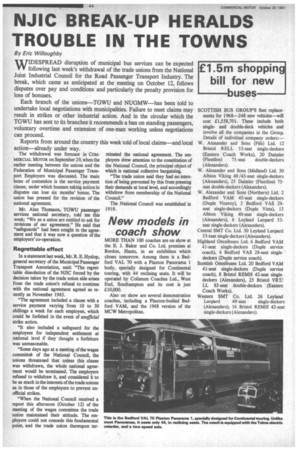NJIC BREAK-UP HERALDS TROUBLE IN THE TOWNS
Page 46

If you've noticed an error in this article please click here to report it so we can fix it.
By Eric Willoughby WIDESPREAD disruption of municipal bus services can be expected following last week's withdrawal of the trade unions from the National Joint Industrial Council for the Road Passenger Transport Industry. The break, which came as anticipated at the meeting on October 12, follows disputes over pay and conditions and particularly the penalty provision for loss of bonuses.
Each branch of the unions—TGWU and NUGMW—has been told to undertake local negotiations with municipalities. Failure to meet claims may result in strikes or other industrial action. And in the circular which the TGWU has sent to its branches it recommends a ban on standing passengers, voluntary overtime and extension of one-man working unless negotiations can proceed.
Reports from around the country this week told of local claims—and local action—already under way.
The withdrawal was forecast in COMMERCIAL MOTOR on September 29, when the earlier meeting between the unions and the Federation of Municipal Passenger Transport Employers was discussed. The main bone of contention is the service payment clause, under which busmen taking action in disputes can lose six months' bonus. The union has pressed for the revision of the national agreement.
Mr. Alan Thomson, TGWU passenger services national secretary, told me this week: "We as a union are entitled to ask for revisions of our agreement." He said that "safeguards" had been sought in the agreement and that it was now a question of the employers' co-operation.
Regrettable effect In a statement last week, Mr. R. E. Hyslop, general secretary of the Municipal Passenger Transport Association, said: "The regrettable dissolution of the NJIC forced by the decision taken by the trade union side arises from the trade union's refusal to continue with the national agreement agreed as recently as November 1965.
"The agreement included a clause with a service payment varying from 10 to 30 shillings a week for each employee, which could be forfeited in the event of unofficial strike action.
"It also included a safeguard for the employees for independent settlement at national level if they thought a forfeiture was unreasonable.
"Some days ago at a meeting of the wages committee of the National Council, the unions threatened that unless this clause was withdrawn, the whole national agreement would be terminated. The employers refused to withdraw it, and considered it to be as much in the interests of the trade unions as in those of the employers to prevent unofficial strikes.
"When the National Council received a report this afternoon (October 12) of the meeting of the wages committee the trade union maintained their attitude. The employers could not concede this fundamental point, and the trade union thereupon ter minated the national agreement. The employers drew attention to the constitution of the National Council, the principal object of which is national collective bargaining.
"The trade union said they had no intention of being prevented by this from pressing their demands at local level, and accordingly withdrew from membership of the National Council."
The National Council was established in 1919.
MORE THAN 100 coaches are on show at the E. J. Baker and Co. Ltd. premises at Bordon, Hants, in an exhibition which closes tomorrow. Among them is a Bedford VAL 70 with a Plaxton Panorama 1 body, specially designed for Continental touring, with 44 reclining seats. It will be operated by Coliseum Coaches Ltd., West End, Southampton and its cost is just 10,000.
Also on show are several demonstration coaches, including a Plaxton-bodied Bedford VAM, and the 1968 version of the MCW Metropolitan. SCOTTISH BUS GROUP'S fleet replacements for 1968-248 new vehicles—will cost £1,558,701. These include both singleand double-deck vehicles and involve all the companies in the Group. Details of individual company orders:-
W. Alexander and Sons (Fife) Ltd. 12 Bristol RELL 53-seat single-deckers (Eastern Coach Works), 20 Daimler (Fleetline) 75-seat double-deckers (Alexanders).
W. Alexander and Sons (Midland) Ltd. 30 Albion Viking 40 /43-seat single-deckers (Alexanders), 25 Daimler (Fleetline) 75seat double-deckers (Alexanders).
W. Alexander and Sons (Northern) Ltd. 2 Bedford VAM 45-seat single-deckers (Duple Viceroy), 3 Bedford VAS 29seat single-deckers (Duple Vista), 13 Albion Viking 40-seat single-deckers (Alexanders), 6 Leyland Leopard 53seat single-deckers (Alexanders).
Central SMT Co. Ltd. 30 Leyland Leopard 53-seat single-deckers (Alexanders).
Highland Omnibuses Ltd. 6 Bedford VAM 41-seat single-deckers (Duple service coach), 6 Bedford VAS 28-seat singledeckers (Duple service coach).
Scottish Omnibuses Ltd. 20 Bedford VAM 41-scat single-deckers (Duple service coach), 8 Bristol REMH 42-seat singledeckers (Alexanders), 25 Bristol VRT/ LL 83-seat double-deckers (Eastern Coach Works).
Western SMT Co. Ltd. 26 Leyland Leopard 49-seat single-deckers (Alexanders), 16 Bristol REMH 42-seat single-deckers (Alexanders).








































































































































